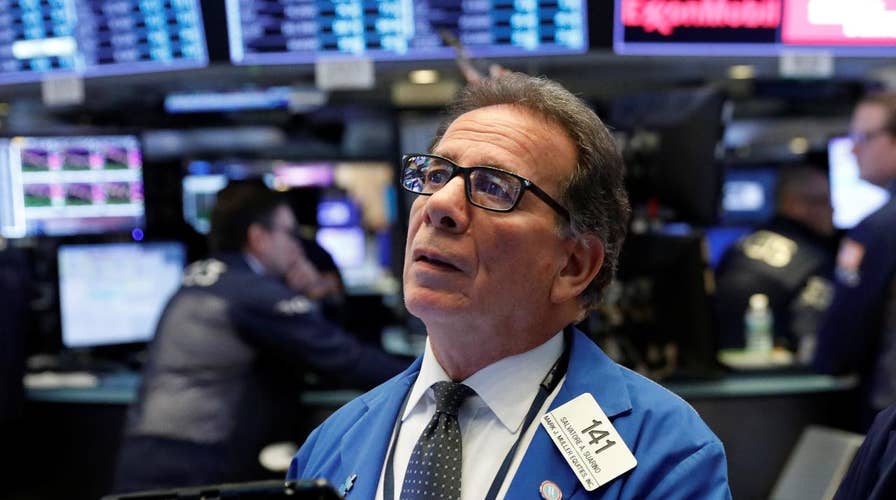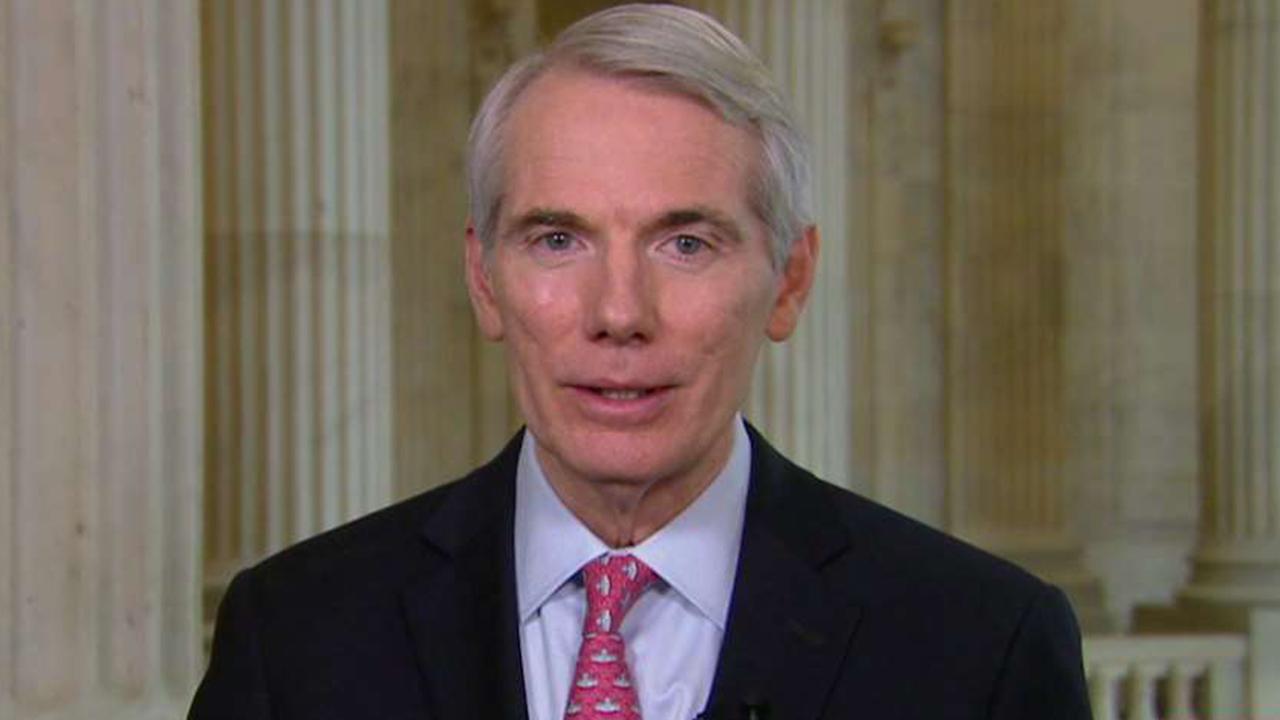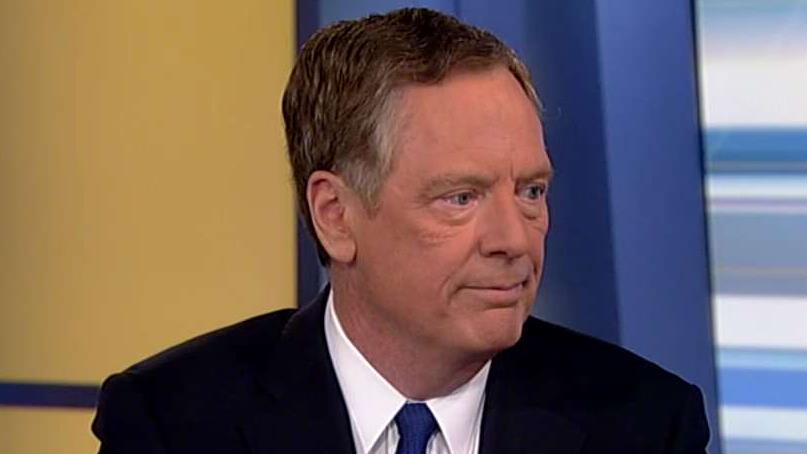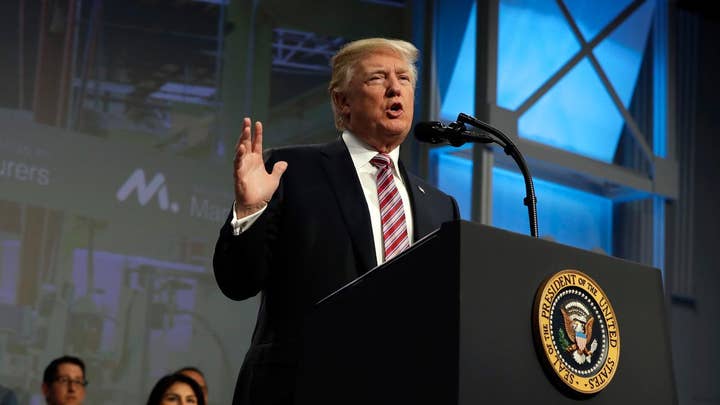Stocks plummet after President Trump talks tariffs
Sharp selloff on Wall Street as trade war, inflation fears spike; FBN's Deirdre Bolton explains.
Stocks plunged Thursday after President Trump announced plans to slap tariffs on steel and aluminum imports.
The Dow closed more than 420 points down after the announcement. Trump said the tariffs will level the playing field for American companies and help them expand after plant closings in recent years.
Trump made the dramatic announcement after participating in a listening session with 15 representatives from the steel and aluminum industry. Following the comments, the Dow Jones industrial average dropped as much as 500 points Thursday.
"You will have protection for the first time in a long while and you are going to regrow your industries," Trump told the executives. "That's all I'm asking. You have to regrow your industries."
The president said he decided on tariffs of 25 percent for steel and 10 percent for aluminum.
“So steel and aluminum will see a lot of good things happen,” Trump told reporters at the White House. “We're going to have new jobs popping up."
TRUMP SAYS HE WILL ORDER TARIFFS ON STEEL, ALUMINUM IMPORTS NEXT WEEK
“I remember when I was growing up, U.S. Steel -- that was the ultimate company. And today you have so many closed plants.”
Trump also said his decision to impose tariffs is because "we need great steel makers, great aluminum makers for defense.”
Trump said he hoped it will lead to more “vibrant companies,” though told the executives “the rest is going to be up to management to make them truly great.”
“I remember when I was growing up, U.S. Steel -- that was the ultimate company,” Trump said. “And today you have so many closed plants.”
The announcement, though, faced pushback from some Republicans, including usual allies.
“Tariffs on steel and aluminum are a tax hike the American people don’t need and can’t afford,” Senate Finance Committee Chairman Orrin Hatch, R-Utah, said. “I encourage the president to carefully consider all of the implications of raising the cost of steel and aluminum on American manufacturers and consumers.”
Increased foreign production, especially by China, has driven down prices and hurt American producers. The Commerce Department calls the situation a national security threat.
However, any action to impose tariffs is likely to escalate simmering tensions with China and other U.S. trading partners. Critics of such a move fear that other countries will retaliate or use national security as a pretext to impose trade penalties of their own. They also argue that sanctions on imports will drive up prices and hurt U.S. automakers and other companies that use steel or aluminum.
But Trump claims he's looking out for American jobs.
He said he's taking action because the North American Free Trade Agreement and the World Trade Organization has been “a disaster for this country.”
“It has been great for China and terrible for the United States,” he said.
Trump has been facing a pair of April deadlines to make a decision on the imports. Administration officials gave mixed signals earlier Thursday about what the president would decide.
Trump, though, gave a window into his thinking when he tweeted about the industries Thursday morning.
“Our Steel and Aluminum industries (and many others) have been decimated by decades of unfair trade and bad policy with countries from around the world. We must not let our country, companies and workers be taken advantage of any longer. We want free, fair and SMART TRADE!” he wrote.
Participants in Thursday’s closed-door meeting, arranged by Commerce Secretary Wilbur Ross, represented industry companies Arcelor Mittal, U.S. Steel Corporation, Nucor, Evraz, JW Aluminum, Century Aluminum, Chester Roush, Timken Steel, United Aluminum and AK Steel.
The Commerce Department has recommended tariffs on all steel and aluminum imports, higher tariffs on imports from specific countries or a quota on imports.
Trump last year ordered an investigation into whether aluminum and steel imports posed a threat to national defense.
The rocky day on Wall Street extended a weeks-long run in which the stock indexes have whipsawed, leaving investors flumoxed.
Industrial companies were hardest hit by the developments. Heavy equipment maker Caterpillar fell 2 percent and aerospace giant Boeing gave back 4 percent.
Big exporters like Apple and drugmaker Pfizer, which would suffer if trade tensions picked up, also fell.
Fox Business’ Blake Burman and The Associated Press contributed to this report.








